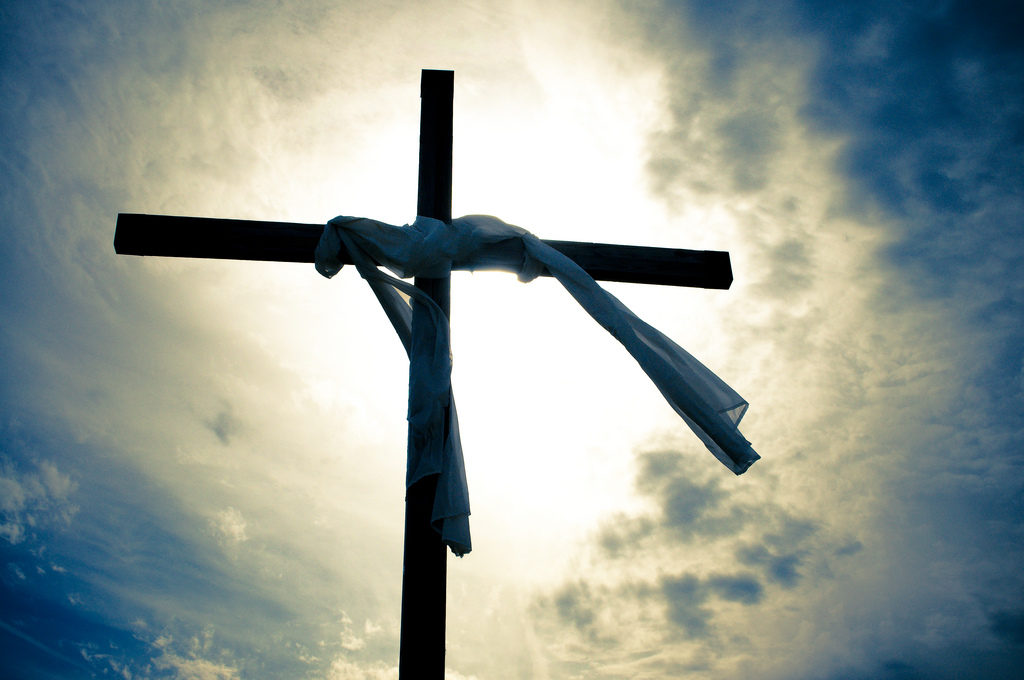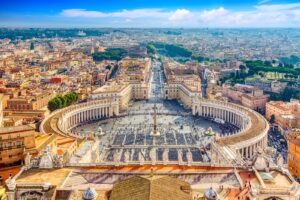Not infrequently one hears Christians described as living between Good Friday and Easter Sunday. The idea, so far as I can tell, is that Christians live between the death of Jesus on the cross and his appearing in victory.
Most Christians think Jesus won a victory on the cross. But a good number of theologically conservative Christians, perhaps trying to avoid liberation theology or the social gospel (and there is good reason to avoid both), seem to think the implementation of that victory is yet to come. We live between the accomplishment of Jesus’s victory and its implementation. Often this view goes hand in hand with the notion that the salvation Jesus accomplished for us consists in the world to come—in going to Heaven when we die. In other words, it’s for another time or another place. It’s certainly not something here and now.
This notion that we live between Jesus’s crucifixion on Good Friday and his resurrection on Easter Sunday, however, is quite wrong. It matters a great deal that we live not only after Good Friday but also after Easter Sunday. For His resurrection vindicates His claims and the work of the cross. At the cross of Israel’s Messiah, evil took out all its fury, as the powers of darkness sought to do their worst to hold the Kingdom of God at bay. But the powers failed, and Jesus of Nazareth assumed His place as the world’s only true Lord. According to British theologian and historian N.T. Wright, the cross of Jesus is the place where He is installed as the world’s rightful Lord. It is also the place where He takes on the consequences of human sin and idolatry, bearing them in full, and ending the exile of Israel in particular and of humanity in general. What Pontius Pilate and Roman soldiers intended as parody, says Wright, YHWH intended as reality.
We live after Easter. Christians are Easter people who live in the new age while the long shadow of the old remains. We live after the inauguration of God’s Kingdom and His new age, yet we await its consummation, our resurrection, and the deliverance of the cosmos when God renews the earth and when His kingdom is on earth the same way it is in Heaven. For now, His kingdom is on earth, but in a different way than it is in Heaven. On earth, it now meets resistance. But we are not waiting for things to begin to be made new. They are being made new. The Messiah of Israel already conquered all through His suffering and death. It is for us to implement that victory in the world.
Start your day with Public Discourse
Sign up and get our daily essays sent straight to your inbox.Citizens of Heaven and Earth
But just here there is a hard pill to swallow. As Wright says in The Day the Revolution Began, the means of implementing the victory of Jesus are the same as the means by which it was won: suffering and death. “Unless a grain of wheat falls to the earth and dies . . .” The implementation of God’s Kingdom is cruciform, just like Jesus’s establishment of it. That means suffering and death. But in that suffering and dying we live as ambassadors not of a kingdom coming or of a kingdom in some other dimension called Heaven but of a Kingdom now present that bears witness to a new way of being human.
The presence of the Kingdom of God here and now means that Christians are not merely citizens of the country where they reside. They are also citizens of Heaven, as St. Paul says. As Wright notes (building, in part, on the work of others like Richard Horsley), the world into which Christianity emerged already had a Lord (kurios/kyrie) and savior, who announced a gospel of peace and justice. His name was Caesar. Indeed, Augustus Caesar was celebrated by poets like Virgil and Horace for having inaugurated a new age—for having inaugurated the golden age. Yet Christianity announced another Lord, another savior, another gospel. And while Christianity taught respect for those who exercised government over human communities, it simultaneously subverted the pretensions and claims of Rome and Caesar and of those who carried out his rule.
The Christian claim—that all authority in Heaven and on earth had been given to Jesus of Nazareth and that He is now Lord over all lords and King over all kings—meant that the claims of Jesus and His Gospel trumped the claims of Caesar and the Gospel of Roman rule and peace. The Pax Christi was in direct confrontation with the Pax Romana. Those were different peaces, different orders. Moreover, in the Christian view, whenever the law of the Messiah and of His Kingdom came into conflict with the law of Rome, Christians were to obey God rather than men. The crucified Jesus of Nazareth was Lord of Caesar, and His followers were bound to acknowledge that, even to the point of dying.
The inauguration of the Kingdom of God on earth entailed a severe demotion for human rulers—who had, for much of human history, been viewed either as gods or as the representatives of the gods. While taking the idea of political authority seriously, Christianity made it clear that human rulers were mere men, subordinate to the authority of God just as much as other men. Their commands were not to be obeyed when they were contrary to the law of God.
New Testament scholar Richard Horsley notes (see p. 8 and pp. 206-214 here) that the Greek word ekklesia, translated by “church” in English, originally referred to the assembly in the Greek polis. When St. Paul was traveling the Mediterranean basin setting up “churches” he wasn’t simply starting a new religion (as conventionally understood, anyway). He was establishing communities—communities that were an alternative to Rome. These communities were designed to instantiate God’s new way of being human. They were dedicated to a different way of living than those one might find within the bounds of the Roman empire. That is not to say such communities did not involve worship of Jesus of Nazareth and the God of Israel. Such worship was their raison d’etre. But rather than merely representing the advent of a new religion within a larger society, they formed an alternative society.
Christians were to live and act, in community with other Christians, on the basis of the truth that all things had been subordinated to the Messiah of Israel. They were not to obey whatever human rulers commanded, as if Jesus were not Lord over them. Installed on a Roman cross and vindicated in resurrection, Christ now ruled over human rulers as Lord and King. And Christians—whose true citizenship is the Kingdom of God here and now—were to be emissaries of that rule.
Servanthood, Power, and Suffering Love
Of course, we must remember Jesus’s teaching that human kings and emperors understood rule and power all wrong. They had it backwards, upside down, and inside out. Rule or authority properly understood is servanthood—indeed, is a sacrificial giving of oneself for the good of others. Rule and authority, as God conceives it, were never more clearly embodied than by Jesus on the cross, suffering the consequences of sin and evil in order to free humanity from long exile to the powers that enslaved them.
At times, we may be tempted to see Jesus as embodying a way of life Christians should follow, but a way that can be detached from rule and authority as such. We are tempted to imagine Jesus coming again in glory to rule with an iron fist—not with suffering love but by domination and raw power. We must remember, however, that the cross is paradigmatic for Christians. God is at His most God-like at the cross. God exercises his providential rule over the world more at the cross than anywhere else, as He—in the person of Jesus of Nazareth—suffers the consequences of sin, death, and enslavement to idols, thereby ending humanity’s long exile. He exercises rule at the cross by being a servant.
Indeed, that is the lesson of Jesus washing His disciples’ feet. Haven’t you heard, he once asked them, how the gentiles exercise rule over their subjects. It is not to be so with you. You are to do things differently, he told them. Not, we might note, because they were members of a new religion and were to act a certain way in some distinct religious sphere while leaving the notion of political rule and government just as it was. The model Jesus provided for leadership was the very model of rule and authority itself—the model of rule for the Kingdom over all kingdoms. By acting as a servant, washing the feet of His disciples, and suffering the consequences of idolatry and sin on their behalf, Jesus modeled leadership, rulership, and authority as such. He provided a new way of leading—not a model of leadership for one part of life (the religious rather than the political) but over and against the way rulers usually exercise rule over their subjects.
When we think of Jesus as providing a model for behavior for the religious realm or the private realm or in the civic realm rather than politics and government, we adopt a fragmentation utterly foreign to the New Testament—foreign to Jesus’s new way of being human. To say that Jesus provides a set of standards (say, the Sermon on the Mount) for life outside government and politics, while another standard applies to life within those structures, is either to say that Christians must not work within those structures, or to say that we must sacrifice integrity for spiritual and moral schizophrenia. Jesus’s revolution changes not only how we view things like poverty, need, and charity but also how we view political rule.
We live after Jesus started all this. We’re not waiting for a kingdom coming. The kingdoms of this world have already become the kingdoms of our God and of His Christ, even though, for the most part, they do not know it yet. Those who claim to follow Jesus of Nazareth are emissaries of that Kingdom and commissioned to enact it not some day in the future but here and now.
What Jesus proposed and enacted is truly revolutionary. And anyone who studies history with any care must know that the advent of His Kingdom really did change things. Hospitals, charity, concern for the poor, the rejection of infant exposition and abortion, all these and more trace their origins to Christianity. As Larry Hurtado suggests (especially in Chapter Five of his book), Christianity was the destroyer of the gods that held all these things at bay. Moreover, Jesus’s revolution was so radical that, as it moved into the pagan Roman world, it placed the lives and livelihood of all who followed Jesus in great jeopardy. And I cannot see how anyone could have arrived at the life-costing conclusion that Jesus of Nazareth possesses all authority in Heaven and on earth unless he or she saw some powerful act vindicating His coronation on a Roman cross. So far as I can tell, unless He rose from the dead, as his first followers claimed, His revolution would have been an utter failure. No one would have suffered and died to see His kingdom come on earth as in Heaven if He had not risen.
Ah, but if He did win that victory, then He really is Lord of earth. Not just someday, but here and now. And we who claim to follow Him are to be ambassadors of His rule.












